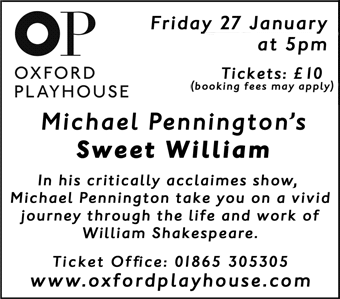January 30, 2012
If it takes ten thousand hours of practice to make a virtuoso then I’m not sure what that makes Michael Pennington - as stated in the subtitle to his show (and accompanying book) Sweet William he has spent ‘Twenty Thousand Hours with Shakespeare’. If nothing else, it makes him an excellent companion on a whistle-stop tour of Shakespeare’s life and works.
A show such as this could have been very dry - an hour and a half lecture repeating for the thousandth time that we know surprisingly little about the facts of Shakespeare’s actual life, punctuated with the occasional ‘to be or not to be’ and rounded with a sleep. Instead, Pennington gives us his own personal experience of Shakespeare. How he first encountered him on a family outing to see Macbeth when he was a young boy, then linking into Shakespeare’s portrayal of children. How he believes that Shakespeare joined a travelling theatre company in those lost years between Stratford and London, then linking into his own experience of being in a touring Shakespeare company and the difficulty of transporting stage weapons in Hong Kong (a universal problem, surely).
Pennington’s passion is clear throughout the show, especially when he discusses Shakespeare’s language. As we the audience love to have Shakespeare’s words in our ears, Pennington the actor clearly loves to feel the words on his tongue, deftly launching into a number of lesser-known speeches from a variety of the plays and sonnets, becoming a young boy, an old man, a spurned lover, all the while managing not to come across as an arrogant luvvie showing off his range.
Near the end of his talk Pennington describes Shakespeare as a master ventriloquist who created a multitude of voices. Continuing with that metaphor, and not sounding like it but intended entirely as a compliment, Pennington is a master dummy.
A show such as this could have been very dry - an hour and a half lecture repeating for the thousandth time that we know surprisingly little about the facts of Shakespeare’s actual life, punctuated with the occasional ‘to be or not to be’ and rounded with a sleep. Instead, Pennington gives us his own personal experience of Shakespeare. How he first encountered him on a family outing to see Macbeth when he was a young boy, then linking into Shakespeare’s portrayal of children. How he believes that Shakespeare joined a travelling theatre company in those lost years between Stratford and London, then linking into his own experience of being in a touring Shakespeare company and the difficulty of transporting stage weapons in Hong Kong (a universal problem, surely).
Pennington’s passion is clear throughout the show, especially when he discusses Shakespeare’s language. As we the audience love to have Shakespeare’s words in our ears, Pennington the actor clearly loves to feel the words on his tongue, deftly launching into a number of lesser-known speeches from a variety of the plays and sonnets, becoming a young boy, an old man, a spurned lover, all the while managing not to come across as an arrogant luvvie showing off his range.
Near the end of his talk Pennington describes Shakespeare as a master ventriloquist who created a multitude of voices. Continuing with that metaphor, and not sounding like it but intended entirely as a compliment, Pennington is a master dummy.




